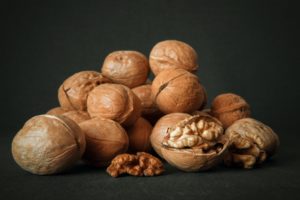I get a lot of questions about beef. What's the difference with different types and brands of red meat? Well, there's good...
...and there's bad beef.
Just like there is good and bad fat.
If you have a cow that never sees a blade of grass, and lives in a food lot, is given daily doses of antibiotics, regular doses of growth hormone...and then on top of that, these cows are force-fed corn and soy, then it produces an abnormal, unhealthy form of fat in that cow. That's not a form of red meat anyone should be eating.

These substances, corn and soy, are very inflammatory in the body (both for humans and cows!). So, those are the things we want to try to avoid.
And I always bring my philosophy down to this: God food, man food. The stuff that God gave us from the beginning of time is the stuff that we need to be putting into our bodies to help build health. These foods will help us get over our difficult and chronic health conditions, because food truly can be medicine. There are foods that are highly inflammatory. There are foods that will reduce inflammation. Beef is a perfect example -- if you choose the right type of beef, it can help calm down that inflammation. If you choose conventional red meat, it's going to feed that inflammation.
Then there’s organic, grass-fed beef. We buy it in our regular grocery store and Walmart carries it. Aldi carries it as well. We have a Giant Eagle in my area that carries it, too. It's a little bit more expensive, but not as much if you go to Aldi. Walmart, their prices are coming down, and you might be surprised at how affordable your grass-fed beef is there.
And truly, it's worth paying a bit more.
These cows are allowed to live on green grass, and then that changes the makeup of their meat, producing an anti-inflammatory, cellular healing effect in the body. Don't let anybody tell you that cholesterol is bad for you. God put cholesterol in our body to help us heal, and it helps us make hormones. It's important for functioning in our brain and our nerves, especially in the sheath that runs around our nerves. So don't get too concerned about the fat and cholesterol contained in red meat, despite what you may hear in the news from time to time.
In fact, I have a YouTube video about beef that I made quickly while I was in the grocery store, which you can see HERE if you're interested.

My wife, she loves steak. So, I regularly get her strip steak that is grass-fed. It's a little bit more pricey, but it's so good for you health-wise. I always tell people that when you get rid of all the junk food that the average American consumes, and then if you really change to more natural foods, you will see a big difference in your well-being.
If money's the real issue with you, you can start doing things that are going to promote better health like not eating out at restaurants as frequently, which is going to save you quite a bit. And if you do eat out at restaurants, choose the right foods to eat in that restaurant.
Snack foods, pizza deliveries, and all of the things that we regularly eat as Americans, they're hurting our health. Foods like grass-fed beef help our health, and if you have to spend a little bit more money, there's no debating it: it's so worth the investment.
So many people are looking for healthier breakfast ideas, right? And most people LOVE their coffee, but wonder if coffee is healthy or not.
We've always been telling people that drinking coffee is not that great for you, and there is some truth in that, mostly because of it's the way the coffee is prepared. It's not necessarily about caffeine intake, as you might think.
About 90% of the coffees out there are not organic, and because they are so heavily ridden with pesticides and herbicides, they're not the best choice for people. Then, the way the coffee is roasted is not that great, either. It can cause the creation of some toxic compounds that you don't want to be putting in your body.

But, there are companies out there like Purity Coffee. I want you to check out their website at PurityCoffee.com.
I have no affiliation with them; they don't know who I am. We just have been recommending them because the people at Purity are really paying attention to not only the quality of their organic coffee beans, but they also test their batches in three facilities around the world. They're really fastidious in terms of how they prepare the coffee, and that sets them apart from so many other coffee manufacturers.
Purity coffee beans are roasted in such a way that they raise the antioxidant level of the beans, which is already quite rich in coffee. And their particular process decreases the toxic compounds that can come from roasting coffee the wrong way.
Brands like Purity Coffee are really turning coffee into a health food. The research, I believe, backs that up. Check out their site, where they have information on all that, so you can read about the details of what sets them apart.
So if you love your coffee and you're looking for something for breakfast, you can make coffee your first meal of the day.
The way you do that is by adding certain healthy oils. I would encourage you to go online and look up bulletproof coffee recipes, which add healthy fat to your coffee. Look, we talk about this a lot in the Cellular Health Accelerator program.
Healthy fat is the biggest missing ingredient in the typical American's lives. We've been brainwashed into believing that fat is not healthy for you. Saturated fat, like in coconut oil in particular, we've been told is bad for us.
Nothing could be further from the truth!
You have to make a distinction between bad fats and good fats, for sure. When you drink coffee with these added fats in them, you are really boosting the nutritional value of that as a drink, and it can be your breakfast. It can be all you have for breakfast. Especially for those of you that are trying to cut your carbs, it can be a great breakfast.
But is coffee healthy? Good question.

So here's how you do it -- and this is how my wife loves her coffee. She'll add to the coffee in her cup a healthy fat of choice; she usually chooses coconut manna, or coconut butter. This is really just crushed-up coconut, but it has a sweetness to it that flavors the coffee just a touch.
Most people add something like coconut oil, which is widely available (thought it's easy to make your own coconut butter -- only one ingredient is necessary: shredded coconut!)
In terms of how much, it's a personal preference, but you could start with about a teaspoon. Some people like a full tablespoon. They'll add the coconut oil to the coffee, and then they may add something like grass-fed butter (I recommend Kerrygold or Amish Butter). Probably, you're going to prefer an unsalted version, but that's up to your particular tastes.
It's not enough to just plop some oil into your mug -- you have to mix it up to make it drinkable.
You can use a handheld immersion blender, a blender like a Vitamix, or a Bullet Blender. If you don't blend it, the oil will sit on top of the coffee, which isn't very appetizing. But when you blend it, it comes out more creamy, and then people really love the taste of it. Plus, you know you're getting the healthy fats.
Another tip? Try adding coconut milk to your coffee.
Choose an organic, full-fat version of coconut milk -- it's the healthiest choice. Be sure to check the ingredient label to ensure there are no unnecessary ingredients. You can also add things like cinnamon to it, or you can even add stevia. My wife has a hazelnut stevia that she will add to the coffee. You can add regular stevia. Some drops of alcohol-free vanilla.
There are a lot of things that you can do to change up your coffee consumption and keep it delicious and healthy at the same time.
I really encourage you to visit PurityCoffee.com. Then, you can get some understanding about the quality coffee that they make and the health benefits to that. And Google “bulletproof coffee recipes.” You'll be able to come up with more ideas that way.
It's just one of the most effective ways to start off your day with healthy fats, and can be mixed into your other beverages like tea throughout the day.
Research shows that the antioxidants in coffee are really helpful for us, but just look for the quality brands, and make it even better by trying out various fats that will make your coffee a healthful way to start your day.
This post is going to be short and sweet -- it's just a quick tip that I think most anyone can use.
One of the biggest problems that I see in our society is the inability to digest and assimilate food. Many, many thyroid patients in particular, in my experience, have a lot of gut damage. There's a relationship between a bad gut and the thyroid.
A lot of our sick patients have low energy as you can read on our reviews page. Many of you can identify with that.

So, we need to be able to get the raw materials for energy into the body, and that starts with digestion. With impaired digestion or compromised digestion, we're not gaining a benefit even in the healthy foods that a lot of you are eating. Even if you try to eat the right foods, you may not be taking in all their nutrients due to improper digestion.
Something simple that I recommend is either taking enzymes that'll help digest your food eating some pineapple. Just take a ring of pineapple, and have that before your meals. The enzymes in the pineapple help you to digest your food better, and it's really tasty all by itself. It may sound simple, but it can make a huge difference in your digestion!
Do you prefer watching videos to reading text? I made a short YouTube video on this subject that you can watch!

The other day, my wife and I were at the movie theater, and I got a text from a patient who was frustrated because she's not progressing as fast as she wanted to be. Then, the next day I talked to her on the phone, and sure enough, she's got some things in her life that she's being exposed to from a chemical standpoint that are potentially really hurting her. She just didn't know about it.
So many people that I see doing the right things either have an ongoing exposure to toxins, or have been exposed enough over a lifetime that they are harboring these chemicals in their body that won't allow their body to ever be healthy. The one thing that you can do is get rid of city water, if that's what you're drinking. Filter your water. Find a way. I have a well, and I made sure that my well water is clean through testing, but most don't have access to well water. In that case, you have to filter your water.

Chlorine is another thing that's in the water. Chlorine and fluoride are in the same family, and they compete with iodine in the thyroid. They will compete at the receptor site with iodine, meaning that iodine can't attach to the cells, and it can't send its signal. So, your body can't utilize it to manufacture more of the thyroid hormones.
 That's just one example. So, if you're drinking city water, you've got to filter your water. My favorite water filter is manufactured by Berkey, and I'll tell you; it's pricey, but it's so worth it to take that extra measure in protecting your health. For all of us, even those who don't have a thyroid problem because, honestly, I could go into detail even as it relates to your husbands, how it could be contributing to weight gain, and fatigue, and things that we see in men across the board. In epidemic numbers, more and more, we're seeing so many of these Western-type, new-millennial-type diseases. So, I just wanted to bring that awareness to you and a couple of tips to help you make sure you're not affected by the harmful chemicals in most drinking water.
That's just one example. So, if you're drinking city water, you've got to filter your water. My favorite water filter is manufactured by Berkey, and I'll tell you; it's pricey, but it's so worth it to take that extra measure in protecting your health. For all of us, even those who don't have a thyroid problem because, honestly, I could go into detail even as it relates to your husbands, how it could be contributing to weight gain, and fatigue, and things that we see in men across the board. In epidemic numbers, more and more, we're seeing so many of these Western-type, new-millennial-type diseases. So, I just wanted to bring that awareness to you and a couple of tips to help you make sure you're not affected by the harmful chemicals in most drinking water.
When it comes to burning fat and improving health, it’s a little bit more complicated than simply eating less and moving more. There are actually many reasons for why more than 2/3 of Americans (and Westerners in general) are now overweight.
Often, when you feel hungry, it is because your body is trying to fill its need for nutrients. When you eat poor-quality foods on a regular basis, your brain will increase your appetite in an effort to obtain the nutrients your body needs to function at optimum levels.
Unfortunately, the foods we crave are not always healthy and nutritious. In fact, even when we try to eat a healthy diet, it can still be difficult to get all the nutrients our bodies need.
That’s why I’ve made this list, showing you what will get you the most bang for your nutritional buck when it comes to your diet.

Of all the berries, raspberries contain the most fiber. There are 15 grams of carbohydrates per cup, of which 8 are fat-fighting fiber (over 30% of the recommended intake!). The fiber boost in raspberries will help keep you feel full for a longer period of time, allowing you to eat less without getting hungry.
Raspberries have been shown to contain ketones, which has been shown in animal studies to prevent an increase in body fat.
You can use raspberries in smoothies, salads, in chia seed pudding, to sweeten up your oatmeal, or just enjoy on their own.

What makes coconut oil so special is that it contains medium chain triglycerides (MCT), which are more rapidly metabolized (burned) as fuel than other fats. This means that instead of being stored as fat, the calories contained in MCT are converted into fuel for immediate use by organs and muscles.
MCT oils have also been shown to enhance fat burning, making them the perfect addition if weight loss is your goal. They have also been shown to support increased energy levels and satiety while reducing cravings.
MCT oil
As far as brain function goes, MCT oil is like rocket fuel because it enhances ketone production. Ketones, of course, are a more efficient fuel for your brain, which is great for focus and productivity, especially while at work.
Coconut or MCT oil can be used as an addition to your smoothies. Because it’s stable at high temperatures, you can also use coconut oil for all cooking purposes on a stovetop or in the oven, like for roasting vegetables.

Olives and olive oil are full of Vitamin E and antioxidants. These help fight the free radicals in your bloodstream that may be the cause of some of the effects of aging, as well as certain cancers.
Olive oil contains 77% monounsaturated fat, which is associated with lowering LDL (the "bad" cholesterol) while also raising HDL (the "good" cholesterol) in your blood. Adding olives and olive oil to your meals will also increase satiety and reduce cravings.
Olive oil is very versatile and can be used in dressings and on veggies. Keep in mind it has a relatively low smoke point, so it shouldn’t be used for cooking.

Walnuts contain an antioxidant compound called ellagic acid that helps to block the metabolic processes causing inflammation. Researchers have found that people trying to lose weight were three times more likely to stick to a diet that included nuts and nut butters.
One study found that adding walnuts into the diets of diabetics improved fat and energy balance. Walnuts are also a good source of plant-based Omega-3 fats, natural phytosterols and antioxidants that are powerful free-radical scavengers. Walnuts have also been shown to reverse brain aging in rats and boost heart health in people with diabetes.
Use these nuts in salads, healthy desserts, breakfast cereals, and trail mix recipes. Since they are portable, they also make a great snack when you are on the go. Choose raw, unsalted walnuts.

Apple cider vinegar (ACV) helps your body to break down and derive nutrients from fats and protein. This will lead to a faster metabolism and more vitality. Both apple cider vinegar and raw apples contain the fiber pectin, which has been shown to increase a person’s sense of fullness while also decreasing their desire to overeat or snack.
Studies also show that ACV also helps control blood sugar levels. Another benefit is that it helps to create an alkaline environment in the body, which promotes overall health and well-being.
You should always dilute apple cider vinegar before drinking it. The easiest way to enjoy it is by adding a tablespoon of ACV to a glass of water. You can even use it as a salad dressing -- top your greens with some extra-virgin olive oil and a splash of vinegar if you like it tangy.

Organ meats are packed with a number of important nutrients like iron, thiamin, folate, selenium, phosphorus, zinc, CoQ10 and several of the B vitamins. Many of these nutrients improve metabolism and promote the production of collagen and elastin, which make you look younger. Getting enough nutrients in your diet will give your body everything it needs for health, and will also keep you from craving unhealthy foods throughout the day.
Since these organs tend to bioaccumulate toxins (along with the beneficial nutrients), only consume organ meats that have come from pastured or grass-fed, organically-raised animals.

Studies show that an extract in spinach called thylakoids decreases food cravings by 95% and increases weight loss by 43%. One study showed that taking thylakoids reinforces the body’s production of satiety hormones, which leads to better appetite control.
Even though virtually all vegetables contain a wide variety of phytonutrients—including flavonoids and carotenoids—spinach can claim a special place among vegetables in terms of its phytonutrient content. Researchers have identified more than a dozen different flavonoid compounds in spinach that function as anti-inflammatory and anti-cancer agents.
But even when unrelated to cancer, excessive inflammation has been shown to be less likely following consumption of spinach. Particularly in the digestive tract, reduced inflammation has been associated not only with the flavonoids found in spinach, but also with its carotenoids. Neoxanthin and violaxanthin are two anti-inflammatory epoxyxanthophylls that are found in plentiful amounts in the leaves of spinach.
Spinach can be sautéed, added to soup, or eaten raw in smoothies, juices, and salads.

Grass-fed beef contains much more Omega-3 than conventionally-raised beef. And it doesn’t contain the hormones, antibiotics, and grain/corn/soy residues that are fed to conventionally-raised cows. When Omega-6 greatly outnumbers Omega-3, it causes inflammation.
Grass-fed beef also contains high levels of conjugated linoleic acid (CLA). Studies show that CLA helps with weight loss and also fights against diseases such as cancer and chronic inflammation. Grass-fed beef is also a good source of creatine, which gives your muscles more energy when you are working out.
Use grass-fed beef in place of conventional beef in recipes.

Eating this leafy green raises key antioxidants that fend off damage caused by free radicals which contribute to DNA damage. One study showed that when individuals ate 3 ounces of watercress daily for eight weeks, they experienced less DNA damage after repeated bouts of high intensity treadmill training.
The researchers also found that watercress had the same effect when participants ate it just 2 hours prior to training, even if they hadn’t been eating it for months. And recently, the CDC reported that among 41 other vegetables, watercress is the most nutrient-dense of all foods!
Add watercress to a garden salad, veggie wrap, or to a green juice.
If these foods are not anything you normally buy, it might feel a little overwhelming on where to begin.
My best advice is to choose one that you like or think that you could find a good recipe for, and work it into your diet. After you’ve conquered that, choose another. Before you know it, most of the foods on this list can be a regular part of your meals.
If you’re serious about getting your energy back, then I invite you to check out my FREE Masterclass. In it, you’ll learn about how to get out from under your fatigue problem, and how my approach is different from anything you’ve tried before.
CLICK HERE to watch this FREE training today!
